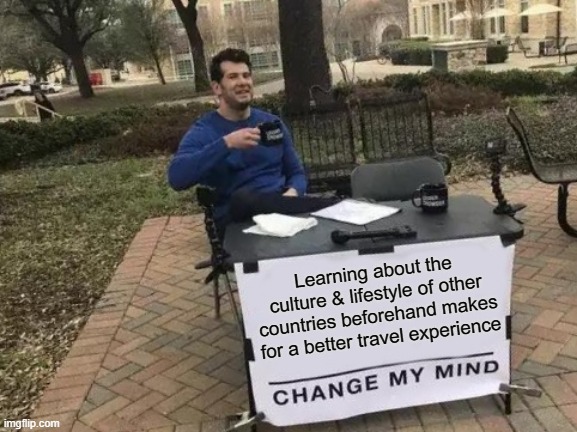5 Tips for First-Time Solo Travel
Things to know when getting ready to travel alone for the first time
October 20, 2021
Are you looking for tips on solo traveling because you are mentally preparing to embark on the journey?
Or, even better, are you ACTUALLY preparing right now for a solo trip?
How exciting!
Before we start talking about booking flights and filling up your itinerary, I’d like to share 5 easy tips I found important to know about during the planning stage.
These tips helped me understand what to expect from solo travel and how I could prepare better to face any challenges!
5 Tips to Have a Great Solo Trip
Tip No. 5 - Wifi/Data is your best friend. Make sure you have the right apps and enough memory on your phone.
→ Wifi and Data
When you touch down at your new international destination, how will you say…hello from the other side?
Being able to communicate from the get-go should be your top priority! Finding a way to let your loved ones back home know that you’ve arrived will not only put them at ease.
A benefit to you is that it will also help you feel more comfortable and you’ll easily be in touch in case of any emergencies.
In today’s world, we rely on our phones so much for our daily tasks and, without a doubt, you’ll rely on yours a whole lot more when you’re traveling alone abroad!
Thankfully, most airports (if not all) have shops where it’s easy for visitors to obtain a SIM card or a pre-paid phone.
If you’re staying for more than a week, it would be wise to get a pre-paid phone or a SIM card. If you choose the SIM route, make sure that your phone is ‘unlocked’ for it to work. An unlocked phone is usually one that is paid in full to your phone carrier.
If you don’t want to purchase an additional item, you can always research international roaming plans with your phone company and determine if that is something you should add to your travel savings and budget.
Another (pricier) alternative would be to consider purchasing a portable wifi hotspot!
→ Phone Memory and Apps
Phone storage is the enemy of solo travel. There are too many photos and videos to take!
Before your trip, check that have enough phone memory and download the right apps for your journey.
The apps that you might use will vary depending on your location but there are some that are almost universal (I.e. Airbnb, Uber, Google Maps, Google Photos, etc). But it’s wise to research location-specific apps that can be useful to you!
To avoid constantly having to delete photos, videos, and apps you’re not using so you have memory space, take some time before you fly out to go through your phone.
Clear out apps you haven’t used in months and delete snapshots or things that don’t spark any joy in you.
If you truly don’t want to do that, then consider downloading third-party apps like Google Photos or Dropbox, or purchasing additional memory cards or online storage!
RELATED POST: HOW TO START SAVING MONEY FOR TRAVEL
Tip No. 4 - Learn about Traditions, Lifestyle & Customs
Becoming familiar with the basics of the traditions and customs of other countries on your bucket list is useful during the planning phase.
Countries have different levels of cultural, religious & political standards. So it’s important that you remain open-minded about differences in lifestyle!
Learning about those differences will help you understand better how to assimilate to a new culture as well as how to reduce any effects of culture shock.
For example, you may want to know, is tipping the same in other countries as it is in the US? Or, is it not even a thing? You may also want to know what kind of clothing the locals wear so that you don’t stand out to the point of making yourself a ‘target’ as a tourist.
In addition, being curious about the traditions and lifestyle will let locals perceive you as respectful of their culture & they’ll just be even friendlier in return.
If you have ever heard of someone saying that locals don’t like a certain type of visitor, they are probably referring to visitors that believe they are entitled to a certain type of treatment just because they are from some specific country.
Just don’t be that person. Take some time to learn about the world around you!
So, do your best to prepare & load up on your knowledge on this aspect of traveling. I 100% guarantee you'll have a better immersive experience & it will open up doors to a lot more opportunities to be a well-rounded traveler just by doing just as the locals do.
Tip No. 3 - Financial Planning & Budgeting is Royalty
Having an idea of how much you’ll need to spend per day during your trip will help you better prepare to make sure that you don’t run out of money when you’re abroad.
If you are anything like me, you’ll probably want to start saving money for your trip at least 3-6 months in advance. This gives should give us enough time to save up but it’s never a bad idea to start earlier!
I aim to save up what I’ll need, plus an additional safety cushion, so that I don’t have to rely on credit cards because girl, you know those transaction fees can be tough on the finances!
It can be very tempting to use credit cards when you travel solo. It might feel good at the moment but it most likely won’t when you have to start paying your debt back 🙁
To start saving up, create a simple Excel sheet to figure out how much you’ll be spending. The goal is to get a ballpark number so don’t get bogged down by exact costs for everything!
Here’s a list of things you should consider:
Big items like flights, lodging, and travel insurance
Middle items like daily food and transportation, cellphone service or wifi, activities, souvenirs, and transportation.
Low items like pocket money, an emergency fund, and a “just in case” fund!
Pocket money, emergency funds, and the “just in case” funds are optional but these will surely make you feel less restricted with your money.
Once you have the total of big items plus middle items, calculate and save up an additional minimum of 10% for pocket money, 10% for an emergency fund, and 30% for a ‘just in case’ expense fund!
SAVINGS EXAMPLE:
If your total forecasted travel expenses come out to $600, then your pocket money should be an additional minimum of $30; your emergency fund would be an additional $30, and the ‘just in case’ fund would range between $120-$240. In total, you should aim to save up a minimum of $780. The more the better!
Big Items + Middle Items = $600
Pocket Money = (0.10)*($600) = $60
Emergency Fund = (0.10)*($600) = $60
Just In Case Fund = (0.30)*($600) = $180
Total of Additional Money (low items) to save = $300
You would need to save up an additional $300 for your low items.
If you are traveling within a certain budget, keep in mind that you may not be able to do and see everything you want to.
You’ll need to pick & choose which activities are most important to you and plan for them.
Tip No. 2 - The Importance of Clothing & Layers
For my first trip abroad, I went to Rome with my University’s summer abroad program and I didn’t do much research.
All I knew is that we were going to be taking classes and having homework. But aside from that, I didn’t know what type of activities we would do outside of school hours.
So, I really didn’t know what to pack!
Mind you, I was 21 when this happened and I was really into fashion then, I really tried to pack my entire wardrobe!
But I realized quickly that I would have to drag around a very heavy suitcase. Especially if I wanted to take a few days after the program ended to visit Paris and Madrid.
So instead, I opted to pack as much as I could on a carry-on. During the trip, I was happy with the choice I made BUT I wasn’t all that thrilled that I didn’t pack the right clothes!
If you’ve visited Rome in June, you’ll know it was in the middle of the hottest months and the best thing is to wear light clothes.
Well, all I packed was two pairs of jeans, one pair of shorts, and running shoes (which I had to wear every day). I didn’t pack more shorts, skirts, or sandals because I thought packing practical stuff was the only choice.
Needless to say, it was uncomfortable sweating so much in denim and socks. That’s how I slowly came to realize that you can actually pack light (and cute) while still being conscious of what pieces work best at the destination.
So, depending on your location, you may need to pack according to the weather, but also keep in mind the cultural standards. This is where Tip #2 comes to play.
Packing better will also allow you to spend more time exploring and doing activities you love without sacrificing precious time of your day to go shopping. Even better, it will save you from spending extra money at a possibly overpriced store!
Tip No. 1 - If Something Feels Off, LEAVE
I truly can’t emphasize enough how important it’s to keep your safety a priority and leave a place or situation when you feel that something is off!
You might think it’s just nerves that are most likely driven by fear of what’s unfamiliar to you but consider that your gut feeling is right!
I have definitely had those moments when my inner voice tells me “Ok girl, it really is time to turn around now” and I just do it. When I get back to my hostel, I never know if turning around was necessary or not but I am always confident that I didn’t want to stick around to find out.
RELATED POST: 26 Safety Tips for Solo Women Travelers
I’d be lying if I didn’t tell you that leaving sometimes makes me feel like I easily gave up; like I wasn’t brave or spontaneous enough.
If you get this same feeling, just know that we are not giving up! It just so happens that our energy told us to go home to rest. We can always come back the next day or during another trip.
As female solo travelers, there’s this unspoken expectation that we have to go through with everything we set our minds to. We want to prove to ourselves & others that we CAN do it.
Well, I’m here to tell you that sometimes it’s okay to not be able to do that. Sometimes it’s okay to say ‘no’ and turn around. No justifiable reasons are needed.
There is no better instance of self-care than to listen to your inner voice & honoring it.
Save this post for later!
Get the scoop on how you can solo travel too!
Lately on IG














